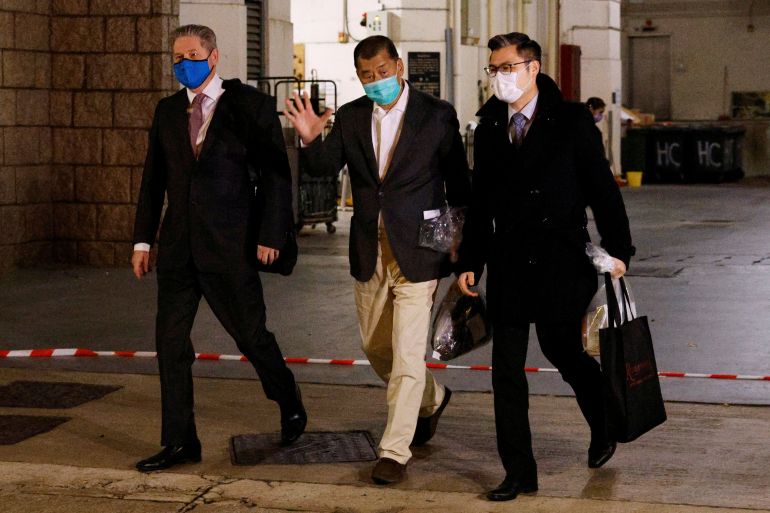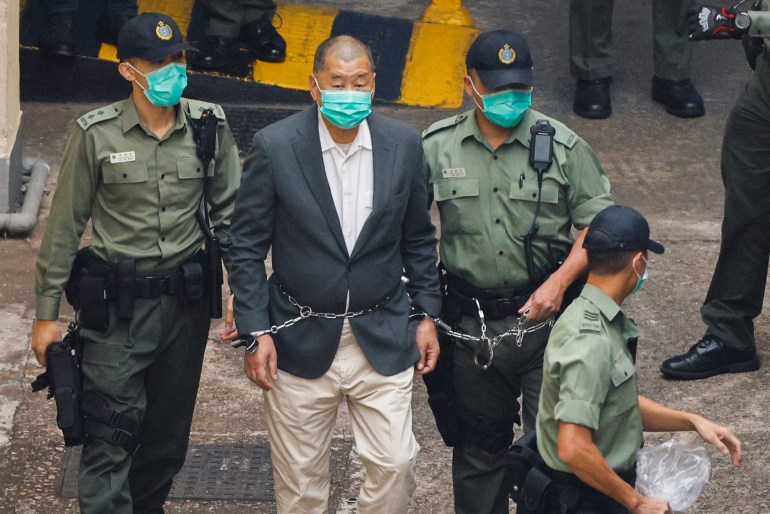Hong Kong pro-democracy tycoon Jimmy Lai granted bail
Accused of ‘foreign collusion’, judge says Lai can return home providing he complies with a series of strict conditions.

Jimmy Lai, a media tycoon and the most prominent pro-democracy campaigner charged under a sweeping China-imposed security law, has been given bail and allowed to return to his home after being taken into custody three weeks ago.
A judge in Hong Kong’s High Court on Wednesday set bail at 10 million Hong Kong dollars ($1.3m) and imposed a series of conditions including that Lai remain at his home, not post on social media, give interviews or meet foreign officials. He was also required to surrender his passport.
Keep reading
list of 4 itemsJimmy Lai appears in Hong Kong court in metal chain
Jimmy Lai charged under Hong Kong’s national security law
Hong Kong: Agnes Chow denied bail after appealing sentence
An immediate appeal by the prosecution was denied.
Lai is one of the territory’s most hard-hitting critics of Beijing, while his Next Media group is considered one of the key remaining bastions of media freedom. He was first arrested in August when about 200 police officers raided the newsroom of his Apple Daily tabloid, an incident that the newspaper’s journalists live-streamed to viewers in the territory and across the world.
The tycoon’s Twitter account was deactivated on Wednesday but there were pictures online of Lai arriving home and waving from the front door.
Jimmy Lai, to comply with bail conditions, has shut down his twitter account. But he’s home. Let’s call it a day.
Photo: @appledaily_hk pic.twitter.com/tRRzM2jnM5— Alex Lam 林偉聰 (@lwcalex) December 23, 2020
The 73-year-old had been in custody since December 3 when he was charged with fraud related to the lease of the building that houses Apple Daily. A week later he was charged with “colluding with foreign powers” – an offence under the National Security Law that was imposed just before midnight (16:00 GMT) on June 30.
The law punishes what Beijing broadly defines as secession, subversion, terrorism and collusion with foreign forces with up to life in jail and has been condemned by critics as a “draconian” tool to crush dissent in the semi-autonomous city, which was guaranteed freedoms unknown on the mainland for at least 50 years when it was returned to Chinese rule in 1997.
Authorities in Hong Kong and Beijing argue the law was necessary after months of protests last year that began with peaceful mass marches against a proposed extradition bill with the mainland and expanded into calls for democracy that sometimes ended in violent clashes.
Under the security law, the defendant has to prove they would not be a national security threat if released on bail. Under Hong Kong’s common law-based legal system, the onus has traditionally been on the prosecution to prove its case.

Lai has been a frequent visitor to Washington, meeting officials, including Secretary of State Mike Pompeo, to rally support for Hong Kong democracy. Beijing has labelled him a “traitor”.
Lai is required to report to the police three times a week. He is next due in court in April.